Bollywood’s unlikeliest top heroine, Katrina Kaif, on two decades of stardom
Katrina Kaif with mid-day’s entertainment editor Mayank Shekhar at the latest edition of Sit with Hitlist
Surely, you’ve seen the film Bachna Ae Haseeno (2008). “If I’m not mistaken, it was Ranbir Kapoor’s second film, and his first for Yash Raj [Films],” Bollywood star Katrina Kaif informs us.
Now, there were four women in that movie. Three you know: Bipasha Basu, Deepika Padukone, Minissha Lamba. The fourth was? Katrina!
The film was, in a sense, a goal unlocked for her—she had been “vying for a Yash Raj production” for some time. Except that once she met producer Aditya Chopra, he said, “The script was getting too long—so we had to snip the fourth female part.”
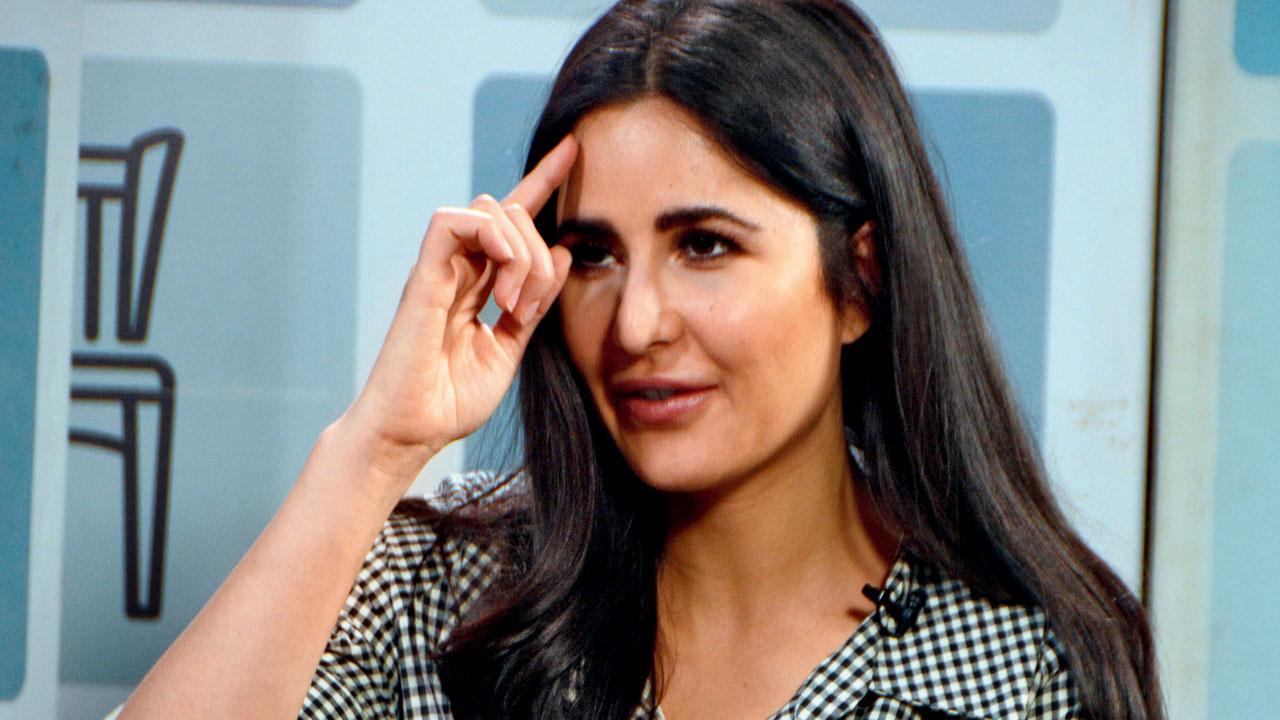
Katrina recalls, “It was a limited role, yes. But I was, like, you gotta be joking! Shortly thereafter, Aditya called me to offer another film.
“He’d already taken me off a big commercial release. My response to the new offer was—he’s instead offering me a small, artsy film, with no songs, scale, dance, and with Kabir Khan, who’s a documentary filmmaker? I was not happy about it!”
Salman Khan convinced her to do the role. He had met Kabir before, discussing his debut, Kabul Express (2006), and was impressed enough—although they worked together on Ek Tha Tiger (2012) much later.
The Katrina film in question is New York (2009), a political drama, set in post-9/11 America. She says, “I walked begrudgingly on to that set, looking disdainfully [in my head], biting my teeth: such a small crew, where are the lights, cameras… I had just come off Singh is Kinng (2008), that had been so massively loved by audiences.”
Cut to the wrap-day of the film’s shoot in New York, and she was crying: “Nobody wanted the shoot to end. Up until this day, New York remains the most amazing and eye-opening experience of my life in films.
“The closest friends I have in the industry are from that film. It played a bit of a role in the journey of my life, thereafter. Kabir gave me the confidence to have my own voice. Something I hadn’t even considered.”
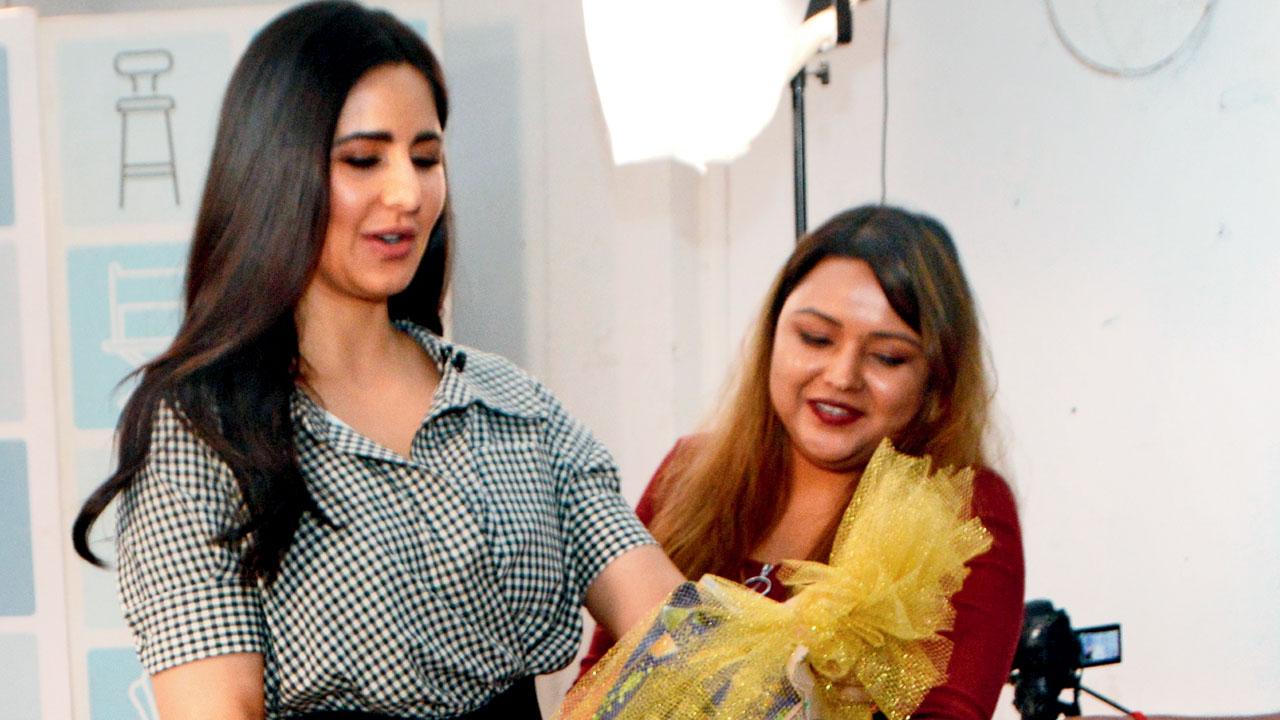
Kaif accepts a token of our appreciation. Pics/Satej Shinde
Until then, Katrina confesses, she went by a simple Bollywood playbook on sets: “Do as told. Quietly.” If you scroll through her filmography thereafter, full of male superstar-driven money-spinners otherwise, you do sense a particular pivot, post New York.
Next stop: Prakash Jha’s Raajneeti (2010), the Mahabharat, adapted into the heartland of India’s politics: “I mean, what an experience, what a shoot!”
Katrina remembers, “There was this sequence in Bhopal, where my character’s husband dies, and I take centre-stage. I look before me. There are 2,000-3,000 people, for as long as your eyes can see.
“I’m supposed to give a speech in front of them, like a politician, and with the film’s entire cast [on the podium]. My hands were trembling. I remember Nana [Patekar] Sir telling me, it’s going to be fine; just go ahead and do it. And it was fine!”
From here on, we can cut further to multiple parts in Katrina’s thoroughly mainstream career, with enough meat for her to juice out as an actor as well—Zoya Akhtar’s ensemble road-trip, Zindagi Na Milegi Dobara (2011, easily my favourite), to Bharat (2019), a synchronous history of contemporary India, told through the lives of its protagonists, with Katrina paired opposite Salman.
But she wants to zero-in, instead, on Aanand L Rai’s Zero (2018). TIL: Before Shah Rukh Khan (SRK) got onboard that picture, it was titled Katrina Meri Jaan, with Katrina playing a double role!
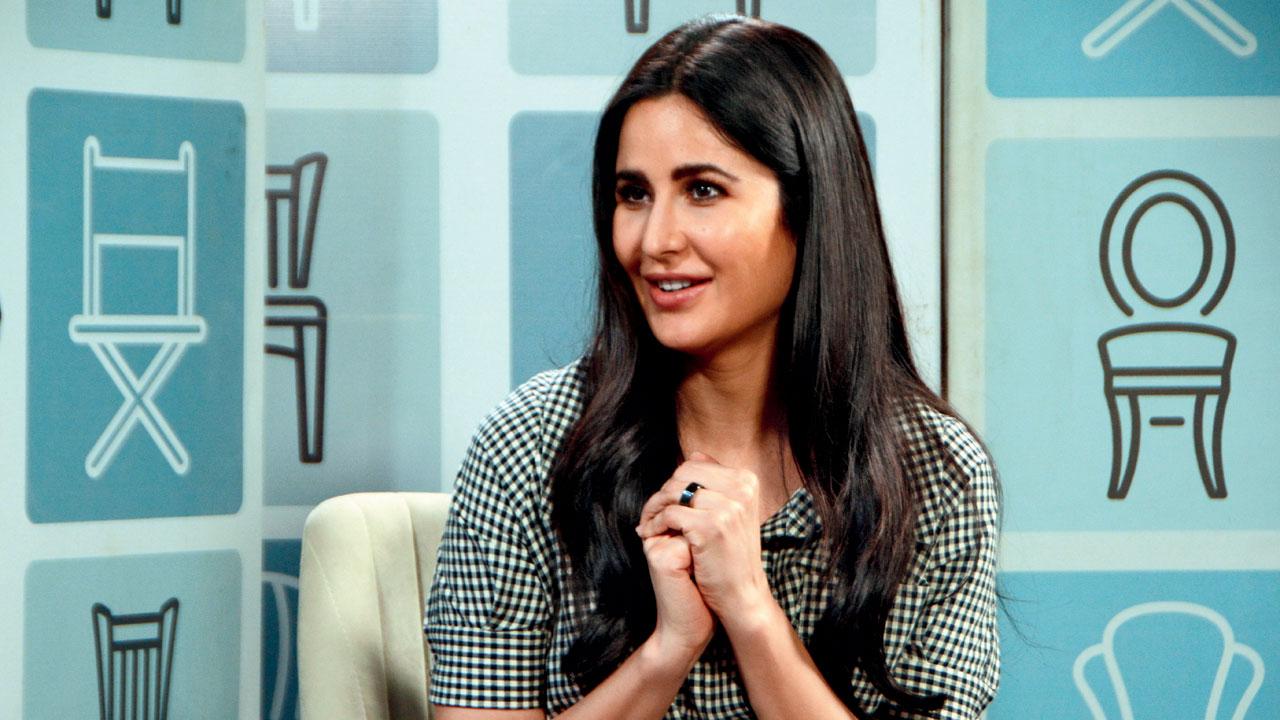
Well, to clarify, “That was a different script. It changed thereafter. But when Anand Sir was narrating me this [new script to play Babita Kumari], my ears and eyes kept perking up to the other female role [of Afiya, suffering from cerebral palsy].
“Anand Sir said he had someone else in mind for it. I went home that day and recorded an audition tape on my iPhone for the part. I went back and showed him the recording on my laptop. It really moved him. That gave me hope, and we kept circling on it, for days.
“I was so attached to the part [eventually played by Anushka Sharma] that I couldn’t even care if there was anything good in what was being offered to me.
“It was Shah Rukh who said I was getting too emotionally attached, and that I should trust him, and do the film. That’s how I got a chance to do [Babita]. It’s one of the best roles I’ve ever done.”
These intercuts into some of Katrina’s more challenging parts are essential. If only to explain how she’s delivered arguably her finest role in films thus far.
That of Maria, in Sriram Raghavan’s Merry Christmas (2024), squarely shouldering a tough, tight plot, primarily set in a South Bombay apartment, flitting between a couple of male characters, while the camera stays on her, almost throughout a stunningly claustrophobic murder mystery!
It is, in many ways, a culmination of sorts. The person you’d instantly think of in that role is probably Tabu. Katrina agrees, “I think Tabu is fabulous, anyway. But I loved her in [Raghavan’s] Andhadun.”

That said, when Sriram and his co-writer, editor Pooja Ladha Surti, first narrated Merry Christmas to Katrina, she found herself asking several questions to do with the motivations of her character: “It’s at the end of this meeting, Sriram Sir said I should write the backstory of Maria—oh, no, wait, it’s been a while, it wasn’t him.
“After that narration, I actually wrote down Maria’s backstory on my own, at home. This was during the lockdown. I emailed it to him, and he loved it. We achieved a more in-depth story, based on that. He’s the kind of filmmaker who gives you that space.”
And yet, if you go through a series of interviews with Katrina before the release of Merry Christmas, she appears to repeat one aspect of her time filming the suspense-drama—that she was crying so much, before and during the filmmaking. Strangely, none of the interviewers seem to ask her, why? Sounds awful—why would she have to cry so much?
Katrina laughs, “Some of the crying [during the shoot] was part of the script.” Clearly, that’s not all. Let’s revisit the timeline again then. “Firstly, there was a major time gap from the narration to when the film went on floors, which was literally three and half weeks after I got married [to actor Vicky Kaushal].
“You’re in this celebratory, jubilant space. There was COVID in between. All I wanted to do was spend time with my husband that we hadn’t had together.
“Since I’m obsessed with my work, diving into this intense and darker film was getting difficult. In my head, I wasn’t in that zone. But once you realise it’s happening, you just have to dive into the deep end.”
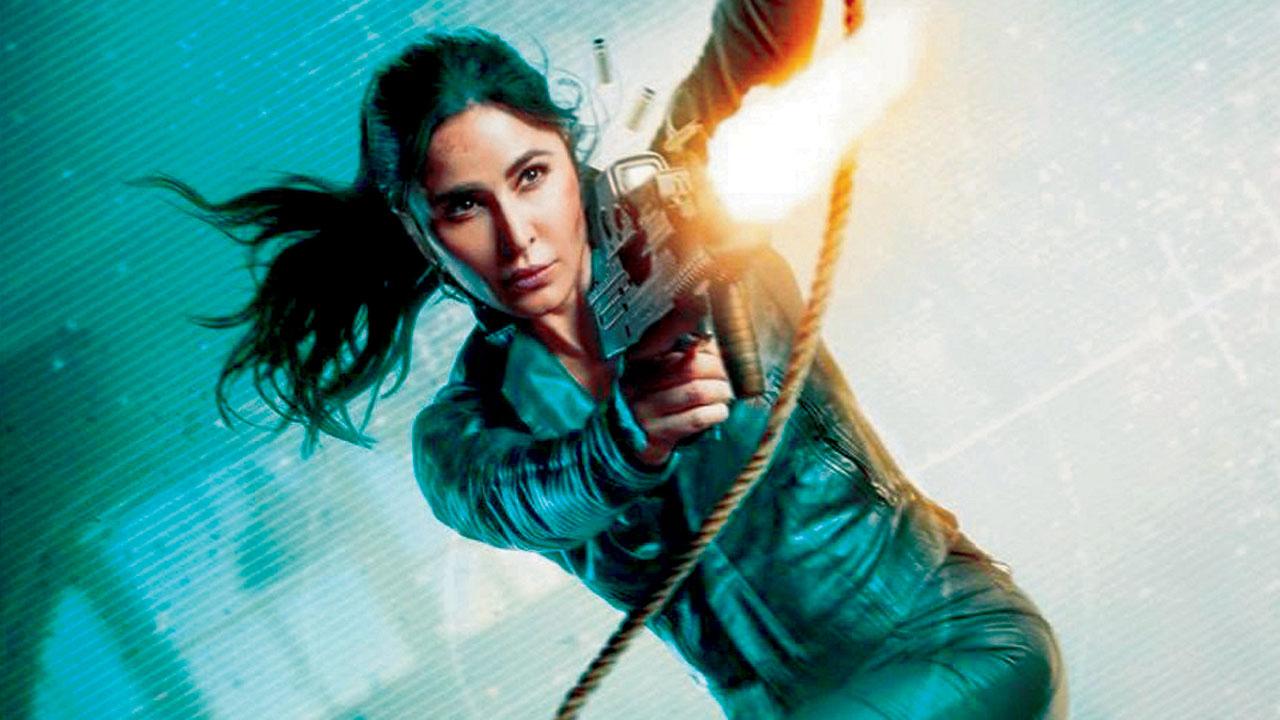
Katrina Kaif in New York, Merry Christmas, and Tiger 3
The other thing, Katrina confesses she has, is a loosely streaming sense of “selective memory”: “Now, Sriram Sir had told me, and this got reconfirmed by my manager—but I had totally passed it over my head—that we had to shoot the film, separately, in Tamil as well!
“One of those things about ignorance being bliss, but it can land you in trouble. Even Sriram Sir hesitated from bringing it up, until four days before he had to remind me, to start the film’s sequences in Tamil; after shooting in Hindi.
“I tried to convince him not to do it. I went so far as asking him to cast another actress for the Tamil part.” Why so scared? “I’ll tell you why: if this was any other film—take my last four releases—doing it in Tamil all over would be fine.
“But this is a very conversational film. There are scenes, where there are 15 minutes of only dialogue. That much of talking, when it has to happen again in Tamil is different. That’s when the tears started.
“The tears of quietness [before that] were for the Hindi portions. Three days, I cried a lot. I was working myself up as well. My [Tamil] dialogue coach, Deepa Venkat, came in, to drop the stress: ‘The moment you hear action, do not think; force yourself; trust what happens!”
I’ve watched the Hindi and Tamil versions of Merry Christmas. She’s pulled off both breezily, looking equally effortless.
For most Indians, the mental image/portrait likely to emerge, once they hear the name, Katrina Kaif, is likely to be the unabashed dancing queen from Chikni chameli, or Sheela ki jawani, aimed at the nation’s front rows, looking for carefree, ‘paisa-vasool’ entertainment.
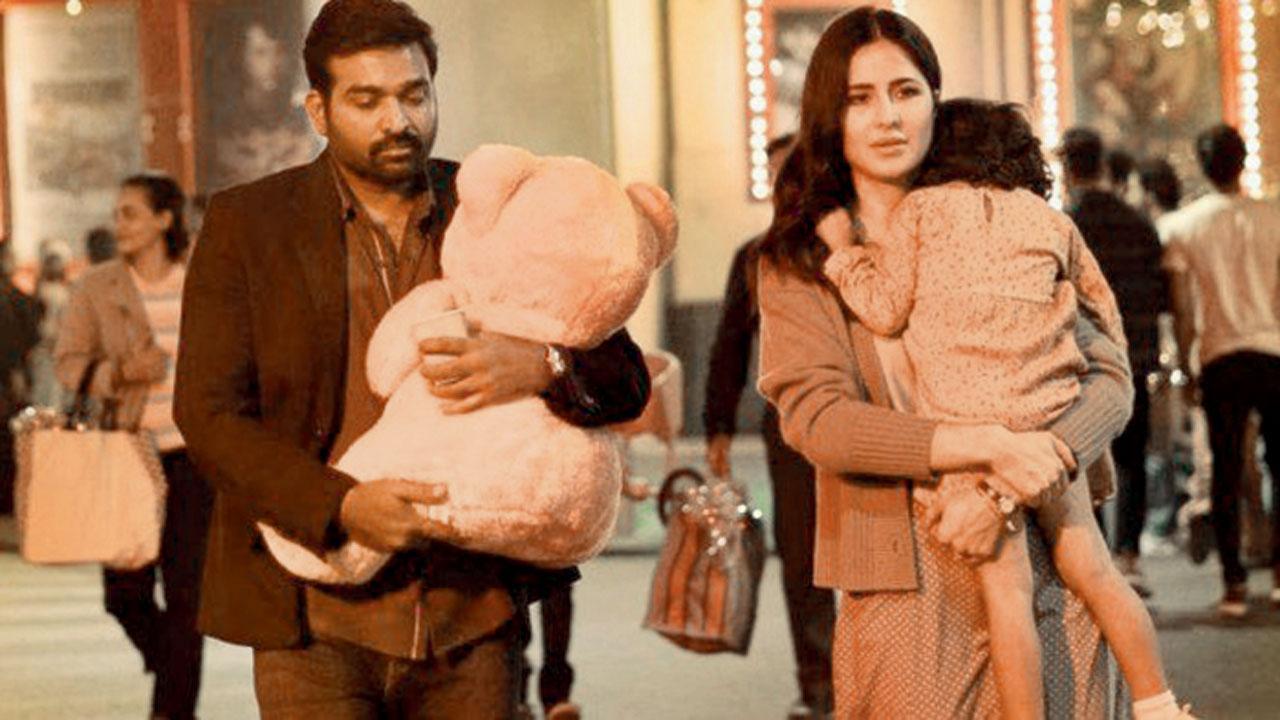
In 2009, Leo Mattel modelled the Indian Barbie on the 10-on-10 Katrina, with a tote bag; then in her mid-20s. She’s been at the top of Bollywood blockbuster scene for two decades.
Yet, if you sit down to casually chit-chat cinema, series, etc—her eclectic palette could surprise you, sometimes.
For instance, in a clip sent over to me by a friend, before I meet Katrina for this edition of Sit With Hitlist, she’s seated with Vijay Sethupathi, her Tamil co-star from Merry Christmas—casually talking up Vijay’s films, Super Deluxe (2019), and 96 (2018).
Both movies would be considered prohibitively avant-garde by desi-commercial standards. Is that the ‘Vicky Kaushal’ effect on her, I gently tease—referring to how her husband, who made his debut with Neeraj Ghaywan’s Masaan (2015), could be exposing her to another world within Indian cinema!
Quick to respond, she says, “As a wife, I do pull Vicky’s leg about how he’s such an art-house film buff. And he’s, of course, totally in tune with all the latest shows and films, and what’s being made. That’s where he comes from.”
But, no, so far as the film 96 is concerned, “I got to see it, because I was approached for its Hindi remake.” Super Deluxe is her late-night OTT, as with any other movie-binger.
Even as an actor, Katrina says, “It’s not like I’ve lived in my own different land. I’ve always been in touch [with all other cinemas].
“For example, Dibakar Banerjee’s films. It’s another matter that [a film together] couldn’t work out. That was because of me. And that’s destiny. But we’ve been in touch. Until about a year and half ago, I was regularly meeting [director] Vasan Bala, discussing ideas.”

Either way, what’s undeniable with any relationship, let alone marriage, is how one tends to inevitably expand interests and friends’ circles, as a result of the partner. With Vicky (they got married in December, 2021), Katrina says it’s been more with the meeting of large families.
“I have six sisters. He has a huge family still back in Punjab. Besides, he has a large circle of friends, from college—I think about 20 of them. Some of whom live in New York, so we meet them, when we’re there…”
Vicky’s father, Sham Kaushal is, of course, an old Bollywood hand—one of the city’s top action directors over decades, who’s equally straddled multiple movie universes within Mumbai; from Black Friday (2004) to Krrish 3 (2013).
Once you probe further, you realise Katrina isn’t as hung up in her head over off-stream and mainstream—the distinction isn’t as marked, or she hasn’t cared to creatively define it.
For instance, she says, “I want to portray myself in a new way now. I don’t wish to repeat myself too much. In several scenarios, I myself feel repetitive and bored. I’m pretty sure, the audiences will, too. I’m no more the 19-year-old, who entered this industry.”
At the same time, she’s clear, her big, 2023 release, Tiger 3, the commercial hat-trick instalment of the Salman blast-fest checks all of those novelty boxes: “Tiger 3 belongs to the amazing franchise—the space that gives me joy.
“It’s not repetitive at all. I found the way [director] Maneesh [Sharma] explored [lead character] Zoya’s backstory was really brave, within an action blockbuster. That’s a side of me close to my heart—I love the female action genre.”
Likewise, with dance, she adds, “When I walked into Dhoom 3, those songs, and dancing to them as a circus performer, looking athletic—that’s been my dream and passion; maybe it’s not someone else’s. Rehearsals in those dance halls is my solace. That’s who I am.”
The film New York indeed provided her a fresher “milieu”, but the film that brought her up to skill as an actor, a gamechanger of sorts, she reasons, was Vipul Shah’s Namastey London (2007): “Even though it was comical, with a romcom tone to it; it was such a great character, and story. Not the typical eas meets West.”
In Namastey London, Katrina paired opposite Akshay Kumar, the other co-star, besides Salman, she’s delivered a string of roaring commercial successes with.
She thinks she’s done more films with Akshay than Salman; starting to count them on her fingertips, while this can be googled in a second. Quick search results in a tie, Salman: 7, Akshay: 7.
Besides the obvious longevity of their respective careers—both Salman and Akshay have been maxing mainstream box-office for over three decades—something she can lay claim to herself, I ask Katrina to decode these two superstars, in terms of how different they are to be on set with, as actors.
She says, “It’s just the morning and night thing—who you see more daylight with. With Akshay [a morning person], I just have to request him for a later call-time on the set. With Salman, it’s the opposite.
“I have to ask Salman, ‘Please come early, no?’ That apart, they’re two totally different individuals. While it doesn’t look it, Salman is always thinking of the larger story of a film, rather than the scene at hand alone. With Akshay, there’s a lot more improvisation.”
Either way, her own riffing off the actors’ energies on shoot doesn’t change: “I’m not focused on what my co-actor is doing. I come prepared to the set. That’s what I do on my own. And then I incorporate that with the director and co-actor.”
To be honest, I tell Katrina, I was a little apprehensive myself, stepping into this interview. Not for the lack of prep, of course. And she’s perfectly genial, even genuinely happy/goofy, to converse with.
It’s just that she may not be the most giving of all interviewees, when it comes to delving further into her life, outside films, or her world, before films.
Even as the intention isn’t to pry on a private life; only to shine a better torch on a public figure. And so be it. A decade ago, I tell her, I had been commissioned by Caravan, a magazine of longform journalism to write a 7,000-word piece (way over twice the size of this profile) on Katrina.
I was drawing a complete blank, for days. Choosing therefore to fill up the space with more of context-setting, instead—history of Anglo-Indians in Bollywood; shift from silent cinema to talkies; the anatomy of the Hindi film dance; a growing expat sub-culture of heroines in desi-mainstream, etc.
While I had chatted with Katrina for a few hours for the piece, there were no expository personal anecdotes, at all. I had asked her then if I could speak to her British mother (Suzanne Turquotte), about her growing up years. She texted back, “Could we rather not?” Totally respect that, of course.
Yet, for a desi pop-culture story, there is none that matches Katrina’s scale—for someone who landed in Bombay, from London, in her late teens, with a friend.
Had only watched one Bollywood film (SRK-starrer, Asoka; 2001), until she made her own film debut, a couple of years later. She knew no one in town, upon arrival. She knew not a word of Hindi, before aspiring to be the quintessential Hindi film heroine, and inching towards the top-spot, soon after.
No, seriously, how? Let’s attempt a step-by-step, still. Even before she got a movie gig, Katrina had landed a contract with L’Oreal, which means she was a successful model, already. But, she says, “My heart was always here, in films. I don’t know how.” Target set, surely what followed was perseverance.
She says she would start her day at 6 am, to attend kathak classes, until noon, in a “small, non-AC room, with Guruji Veeru Krishnan—Priyanka Chopra, Lara Dutta were the seniors [in class].”
With Hindi, actor Jackie Shroff advised her to master the Devnagari script: “On the set, those days, often you’d be handed the dialogues, right before shoot. I didn’t want to be in a position, where I’m wondering what to do. The base in Devnagari saved me. There is then nothing complex [in the learning of the language].”
But beyond all of the above, it was, as Katrina puts it, “Naivete and innocence of the times. Barely at 17, I saw nothing as difficult back then.
“Today, I would say impossible to the same things. Which is strange. I guess that’s what happens when you have nothing to lose. At this point, of course, I have other goals—but I’ve achieved all that I’d set out to do. Yet, criticism would hurt and affect me far more.
When she was starting out, though, “An instance, I remember, from a South Indian film, with Venkatesh [Malliswari, 2024]— I was shooting a song, and there was someone on the set, yelling, ‘This girl can’t dance.’ I’ve had people telling me to my face: ‘You will not make it. You won’t succeed.’
“Somehow, I wasn’t pained. Never felt sensitive about it. For me, it was about taking in the info. It didn’t penetrate me to stop.
“I would sit and cry, but believe in the process in the healthiest way; work a little harder to perfect my craft. Eventually, I worked with all those same people who said, ‘We won’t take you in our films!’”
In Bollywood, David Dhawan’s Maine Pyar Kyun Kiya (2005) was her second film, and her first hit (Ram Gopal Varma’s Sarkar must count as a cameo).
She debuted disastrously with Kaizad Gustad’s Boom (2003), the year’s most anticipated movie—albeit a film so deliciously bad, that it must rank up there among the greats.
As always, bad movies make for the most fun reviews—essentially, stand-up comedy on text/print. That review fetched me the job as a permanent film critic, I tell Katrina, off-record. Unwittingly, I owe her one!
Practically everyone involved with Boom pelted eggs on it, in public, post-release. Not sure about Bo Derek (also in the cast), certainly Amitabh Bachchan; also, Salman Rushdie (his girlfriend, then, Padma Lakshmi, was in the film). Katrina hasn’t said a word on it since. And she continues to maintain that stony silence. Respect her choice, of course.
Was it Tolstoy, who roughly said, a great story is one of two things—a man sets off on a journey, or a stranger comes to town. Katrina is both those splendid stories.
I offer an unsolicited advice—that she should someday write that story. Totally unfiltered, just the way she saw it, with all those things she’s kept to herself since.
She says, “No, thank you. Let’s leave some things unwritten. What I want said is the work I have done, and the work that I hope to leave behind.”
 Subscribe today by clicking the link and stay updated with the latest news!" Click here!
Subscribe today by clicking the link and stay updated with the latest news!" Click here!










